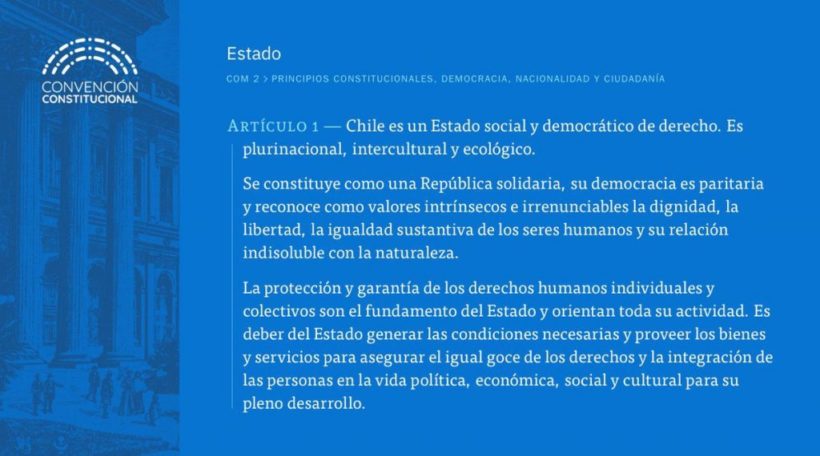(Graphic) State
COM 2 > CONSTITUTIONAL PRINCIPLES, DEMOCRACY, NATIONALITY AND CITIZENSHIP
ARTICLE 1 – Chile is a social and democratic State governed by the rule of law. It is plurinational, intercultural and ecological.
It is constituted as a Republic based on solidarity, its democracy is parity and recognises as intrinsic and inalienable values the dignity, liberty, substantive equality of human beings and their indissoluble relationship with nature.
The protection and guarantee of individual and collective human rights are the foundation of the State and guide all its activities. It is duty of the State to generate the necessary conditions and to provide the goods and and services to ensure the equal enjoyment of rights and the integration of people in the political, economic and social life of the country for their full development.
No more. The fun is over. The Plenary of the Convention approved Article 1 of the new Constitution, which establishes a Social and Democratic Rule of Law and abolishes the subsidiary state. This ensures the end of the lack of social protection that Chilean men and women have suffered in their living conditions. This will put an end to the privilege of the owners of capital to commodify social services.
Article 1 is an indispensable step towards ending the inequalities and abuses that Chilean families have suffered for 40 years, but it also lays the foundations for the country to move towards diverse, inclusive and environmentally balanced economic development.
The 1980 Constitution and the subsidiary state have allowed one third of the income to be captured by the richest 1% of the population; and that 1% is the one that has taken over productive activities and banking; it is the one that controls exports, but also benefits from the profits of the AFP, isapres, schools, universities, football teams and owns the media.
In an unprecedented way, accumulation in Chile has been favoured by the commodification of social services, which are incorporated into our society as an area of capital valorisation. Their provision is a business and, therefore, access to these services depends on each family’s ability to pay.
But, at the same time, alongside the commodification of health, education and pensions, a social policy for the poor has been installed in the country. This is the policy of targeting, which for 40 years has cornered the poor in their poverty and left the middle sectors in uncertainty. This policy showed its failure with the Covid-19 pandemic, as Parliament was forced to universalise the provision of resources for the protection of society as a whole, albeit unfortunately with the withdrawal of the AFP members’ own funds.
Unlike other Constitutions in comparative law, the 1980 Constitution not only defines the aims and objectives of the State, but also established a specific model for organising the country’s economic relations, which is the neo-liberal model. In this model, state interventions are considered distortions to the (supposedly neutral) rules imposed by the market, and this defines it as a subsidiary state.
Thus, together with the denial of social rights to the Chilean family, the 1980 Constitution has weakened the capacity to advance towards true development, by placing the state in a condition of subordination to the market. The subsidiary state neglects environmental protection, does not control the processes of economic concentration, does not generate incentives for investment in science and technology, is not interested in diversifying the economy and mistreats SMEs. Low growth rates and stagnant productivity are largely explained by this immobile state.
Article 1 of the new Constitution is here to change things. The Social and Democratic Rule of Law will guarantee the Chilean family its fundamental social rights and the parity, plurinational and ecological State will open the way to a society in which all voices will be heard.
At the same time, the end of the subsidiary state will allow the public sector to deploy entrepreneurial initiatives and regulate markets, to curb monopolies and price collusion. The active state will be able to reorient economic activity from rentier extractivism towards productive diversification, with protection of ecosystems, gender equality and effective regional decentralisation.
In short, Article 1 of the new constitution will help end inequalities and abuses. Its approval reveals the constituents’ commitment to democracy, citizen protection and inclusive development.












